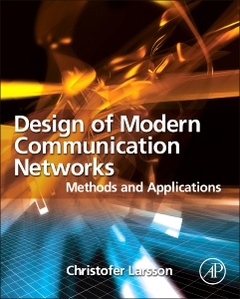Design of Modern Communication Networks Methods and Applications
Auteur : Larsson Christofer

- Introduction
- Networks and Flows
- Advanced Flow Theory
- Topological Design
- Stochastic Processes and Queues
- Loss Networks
- General Packet Networks
- Flow-Controlled Packet Networks
- Effective Bandwidth
- Multi-Service Networks
- Multi-Service Network Analysis
- Survivable Networks
Telecommunications engineers, network researchers and designers, technical managers, CTOs, and operations managers.
Christofer Larsson is a consultant in network design and optimization. He received his master of science in Engineering Physics from the Royal Institute of Technology in Stockholm, Sweden, and has over two decades in telecommunications as network designer at Ericsson, software architect for consultancy firms and system tester for service providers.
- A toolbox of algorithms: The book provides practical advice on implementing algorithms, including the programming aspects of combinatorial algorithms.
- Extensive solved problems and illustrations: Wherever possible, different solution methods are applied to the same examples to compare performance and verify precision and applicability.
- Technology-independent: Solutions are applicable to a wide range of network design problems without relying on particular technologies.
Date de parution : 02-2014
Ouvrage de 456 p.
19x23.3 cm
Thèmes de Design of Modern Communication Networks :
Mots-clés :
Acceptance region; Algorithms; Approximate multi-commodity flow; Approximations; BCMP networks; Basic bandwidth unit; Bellman-Ford; Branch exchange method; Chernoff bound; Circulant; Closed Jackson network; Convolution method; Cumulant generating function; Cut saturation method; Decomposition; Decoupling bandwidth; Dijkstra; Discrete-event simulation; Dynamic programming; Edge cuts; Effective bandwidth; Electrical networks; End-to-end delay; Estimation of blocking; Finite buffer; Fixed-point approximation; Flow deviation method; Floyd-Warshall; Ford-Fulkerson; Genetic algorithm; Goemans-Williamson; Gomory-Hu; Gomory-Hu algorithm; Hayward approximation; Heuristics; Kirchhoff matrix-tree theorem; Large deviations theory; Linear programming; Loss networks; Markov additive process; Markov process; Maximum flow; Mean value analysis; Minimum cost flow; Moe's principle; Moe's principle; Monte Carlo; Monte Carlo simulation; Multi-commodity flow; Multi-dimensional Erlang formula; Multiterminal flow; NP-complete; Network connectivity; Network design; Network programming; Network reliability; Network topology; On-off model; Open Jackson network; Optimization; Out-of-kilter algorithm; Overflow theory; Packet network; Point process; Poisson process; Policing; Primal-dual methods; Processor sharing; Queues; Randomization; Randomized algorithm; Reliability polynomial; Resource allocation; Reversible systems; Routing; Shaping; Spanners; Spanning trees; TCP; The Erlang formulas; The traveling salesman problem; Theta-graph; Traffic; Trunk reservation; Vertex cuts; Virtual channel; Wilkinson-Bretschnieder method; k-connectivity; shortest path



